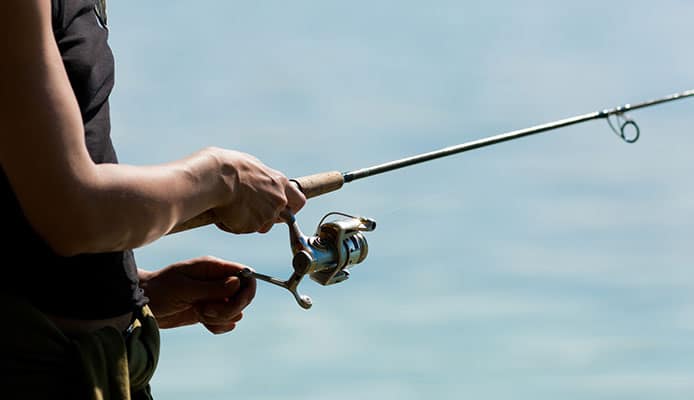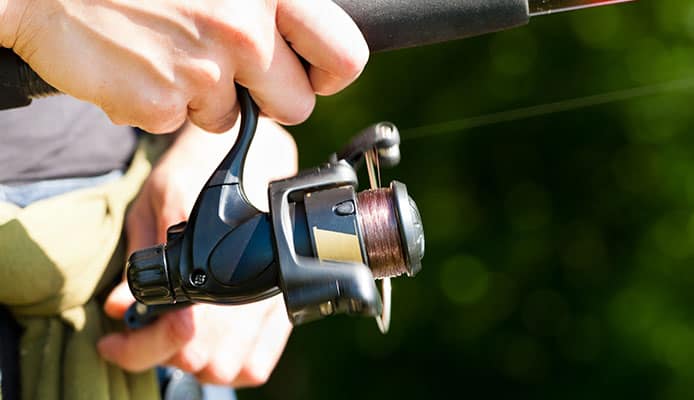
One of the most frustrating parts of being an angler is having to deal with a tangled line that leaves your reel all messed up. And regardless of how many years you’ve been fishing already, this is one problem that seems to pop up now and then. Don’t be too hard on yourself though because even seasoned fishermen find themselves in the same situation every once in a while. However, they do apply some principles and practices to help minimize the occurrence of such problems, and you can do the same if you’re looking to avoid tangled fishing lines or line twist while fishing.
1. Pay Attention to Your Reel
It can be easy to not notice minute inconveniences when you’re caught up in the excitement of reeling in and landing a fish. However, good anglers will always pay attention to their fishing pole especially during the retrieved phase. If there’s a tic or a flapping sound, or if there’s anything at all that doesn’t feel right, they look down and check the rig to catch the potential pileup early on and avoid bigger trouble down the road.
2. Use the Correct Fishing Line
This may appear to be an obvious one, but you’ll be surprised at how many anglers, especially those who are just getting started with fishing, often make the mistake of using the wrong fishing line for their fishing tackle. Although almost all types of fishing lines can be used on any type of fishing tackle, some lines just work better with some tackles. For instance, most spinning reels tend to perform better when paired with a limp braided fishing line, whereas using a monofilament fishing line or a fluorocarbon fishing line may present some issues due to line memory. Take note of the line size as well. Fishing lines with smaller diameters sit better on the spool and are almost always easier to cast.
3. Don’t Overfill Your Reel Spool
Some anglers like having a full reel whenever they go fishing, thinking that the more line they have the more water they will be able to cover and the more fish they are bound to catch. However, this isn’t always the case and will most likely result in the fishing line getting tangled, twisted, or even fly off the spool. That said, avoid over-filling your reel spool and leave about a quarter of an inch of the spool showing when putting the line. This may cause you to miss a few more yards of fishing line, but it greatly reduces the chances of your fishing line messing up.
4. Wound the Line Correctly
Putting the line on your reel is a skill that every angler should master. Yet, novice anglers, especially when they get too excited in setting up their tackles, often neglect properly spooling their lines. Needless to say, this will result in the fishing line getting twisted or tangled. Some anglers will have their own techniques and styles when it comes to spooling their reel. Nonetheless, there are basic steps and guidelines that all anglers must follow like threading the line through the rod guides, using an anchor knot to tie the line to the spool and others. Learn how to spool your reel properly and you’ll be able to avoid messy tangles and twists.
5. Let a Pro Do the Job
To avoid over-filling your reel spool or incorrectly wounding your line on your spool, you can go to your local outfitter and have them do it for you. Aside from knowledge, experience, and expertise, they’ll probably also have a spooling station that will ensure that the line is wound properly. You can also purchase a portable line spooling tool and learn how to use it so you can prevent small loops and line twists when spooling your fishing line yourself.
6. Set the Drag Accordingly
Incorrectly setting the drag can also result in tangled fishing lines. For instance, a spinning reel where the brake is set too loosely will let out the fishing line too easily, thus causing you to reel against the line going out. When this happens, the line will likely get twisted. That said, aim to have your drag set at around 25% of your fishing line’s breaking strength.
You might also like: Fishing Line Color Spectrum Guide
7. Get a New Reel
If you’ve been using the same old reel for a decade now, you may want to consider getting yourself a new one. Aside from keeping with the main purpose of a fishing reel, manufacturers have also considered how their designs can help reduce the occurrences of line tangles and twists. Many of the newer reel models come with sharp roller slopes, grooves in the roller, and larger surface area. All of these features help to eliminate slack in the line’s movement, thus keeping the fishing line in proper position and prevent it from twisting or turning over
8. Remove Twists Immediately
Dealing with the problem as soon as possible is one of the best ways to avoid a completely tangled up line. You can do this by dangling your lure or bait from the rod tip and watch if it spins around. If it does, simply let it keep spinning until it stops. This is often enough to remove any minor twist in the line. If the problem is more severe, you can let a long length of line out behind your boat and drag it along for a few minutes to help the line untwist. Letting your line float downstream in a moderate flowing river or creek can also work well and achieve the same effect.
9. Stretch Your Nylon Lines
Nylon lines tend to have plenty of issues with regards to twisting. One way of keeping this problem at bay is by giving your nylon line a good stretch. You can do this by hooking the line to a firm or heavy object and then pulling on the line with your hands (wear fishing gloves to avoid any unwanted cuts and bruises). Repeatedly casting your fishing line and even battling with a heavy fish will also help to stretch it out.
10. Warm Up Your Nylon Line
Some anglers also soak their nylon lines in warm water before using them. This practice helps to relax the line memory, and this in turn helps to reduce the occurrence of coiling, minimize line-related problems, and even improve casting.
Globo Surf Overview
Tangled fishing lines and line twists happen even to the best of anglers when the above-mentioned practices are ignored. Thus, be sure to keep them in mind while preparing your fishing tackle and you’re less likely to experience this unpleasant problem the next time you hit the waters.


